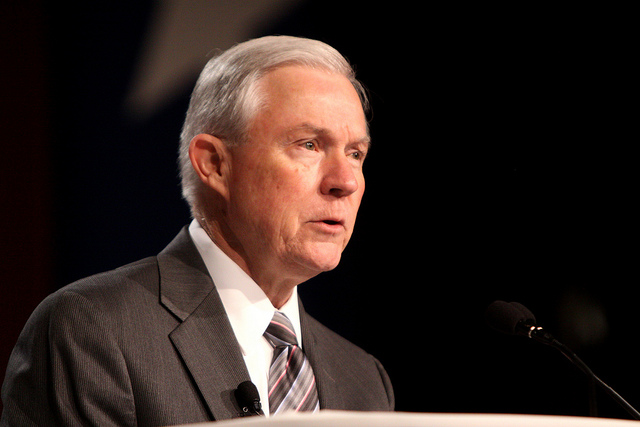Why Sen. Jeff Sessions’ record in Alabama could complicate his confirmation

*This is happening today and it affects all Americans. Jeff Sessions, Donald Trump’s nominee for attorney general, the most powerful law enforcement officer in the country, has a documented history of opposing civil rights and immigration reform. The confirmation hearing is expected to be confrontational. VL
By Gretchen Frazee, PBS News Hour (5.5 minute read) 
At his confirmation hearing this week, Sen. Jeff Sessions will face tough questions about his 20-year tenure in the Senate. But he’ll also be pressed on his record before he entered Congress, when he served as U.S. attorney and Alabama’s attorney general.
Over the past several weeks, as supporters and opponents of the 70-year-old Alabama Republican sharpened their arguments, two strikingly different portraits of the man have emerged.
[pullquote]The Southern Poverty Law Center calls Sessions the “champion of anti-Muslim and anti-immigrant extremists.”[/pullquote]To some, Sessions is a beloved public servant who has represented his constituents faithfully and has the utmost respect for the law.
“He is a world-class legal mind and considered a truly great Attorney General and U.S. Attorney in the state of Alabama,” President-elect Donald Trump said last November, when he announced Sessions’ nomination to head the Department of Justice. “Jeff is greatly admired by legal scholars and virtually everyone who knows him.”
But to others, Sessions is a stumbling block to progress— a man who has argued in court against civil rights, demeaned black aides in his office, and spoken out forcefully against immigration reform.
The Southern Poverty Law Center went so far as to call him the “champion of anti-Muslim and anti-immigrant extremists.” Last week, six people, including NAACP President Cornell Brooks, were arrested during a sit-in protest in Sessions’ Mobile, Alabama office.
Read more stories about Donald Trump’s cabinet nominees and the lack of Latinos on the list. >>
And in an extraordinary move last week, more than 1,200 faculty members, from 176 law schools in 49 states, signed a letter opposing Sessions’ candidacy for attorney general. They expressed concerns about his stance on mass incarceration, climate change, women, the LGBTQ community, immigration and civil rights.
Specifically, the faculty members cited Sessions’ 1986 federal judgeship confirmation, in which he was accused of calling a black colleague “boy” and joking about the Ku Klux Klan. President Ronald Reagan had tapped Sessions to serve as a federal judge, but these comments and the controversy they stirred led the Senate Judiciary Committee to vote to reject his nomination.
Did you like this article?
Help us share the true U.S. Latino story.
[Photo by Gage Skidmore/Flickr]

